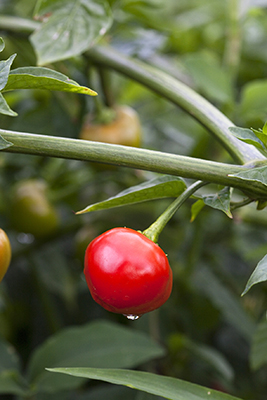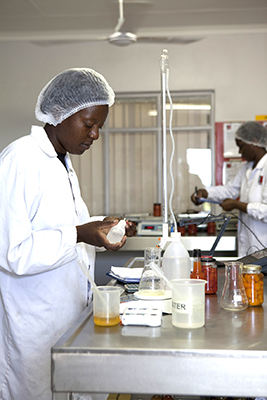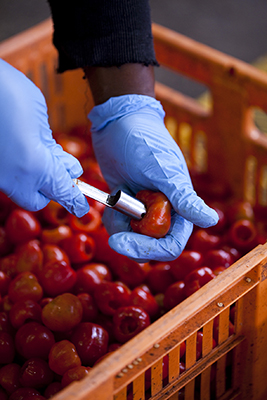PEPPADEW® is the UK’s No.1 pepper brand*, known globally for its Sweet Piquanté Peppers and multi-award-winning PEPPADEW® Bites. Winning silver at the 2023 Casual Dining Innovation Challenge and more recently, the Quality Food Award in the Foodservice Party Food and Buffet category, PEPPADEW® Bites are a game-changer in the premium snack sector.
 In this issue of Food & Drink Matters, we are looking at the timely topic of sustainability across the sector, not shying away from the challenges faced by businesses but also celebrating the triumphs, large and small. PEPPADEW® is one of those companies that is already reaching significant milestones on its journey towards carbon-negative status. With its peppers in brine now only packaged in 100% recyclable glass, there is no single-use plastic on-site. Furthermore, the plastic inserts to keep the peppers in brine are a fully recyclable product, mirroring the circular economy philosophies.
In this issue of Food & Drink Matters, we are looking at the timely topic of sustainability across the sector, not shying away from the challenges faced by businesses but also celebrating the triumphs, large and small. PEPPADEW® is one of those companies that is already reaching significant milestones on its journey towards carbon-negative status. With its peppers in brine now only packaged in 100% recyclable glass, there is no single-use plastic on-site. Furthermore, the plastic inserts to keep the peppers in brine are a fully recyclable product, mirroring the circular economy philosophies.
“We have reduced the tray that our jars fit into on average by 23%, with the tray board fully FSC certified and reduced our shrink-wrap from 80 to 40 micron. We have successfully removed single use plastic by changing to pop caps and are delighted to report that we planted 40 water-wise shrubs (Spekbome) on our PEPPADEW® site and Andzisane trees in 2020.”
“Working with the British Carbon Neutral Trust more recently has strategically enabled us to reduce our carbon footprint,” explained Simon Harris, Brand and Marketing Manager.
Carbon-neutral status
The British Carbon Neutral Trust is the UK’s leading carbon offsetting initiative and empowered PEPPADEW® UK to reduce carbon emissions through a series of meticulous assessments to ascertain an accurate carbon footprint.
A key component to reducing carbon emissions was strategic investment in carbon offset projects through the Trust including reforestation projects, methane capture initiatives, and investments in renewable energy projects.
“We worked with Carbon Neutral Britain to ensure that these projects were not only in the UK, but in Africa too. Now that we have offset our carbon footprint, as a UK team we have defined targets to reduce the amount of carbon emitted.”
“We are continuing to monitor our carbon emissions and moving to continuous improvement to lower our carbon footprint.”
 Beyond ESG: Hydroponic Projects in South Africa
Beyond ESG: Hydroponic Projects in South Africa
Whilst monitoring company carbon emissions at the UK head office in Leatherhead and factory in Weston Super Mare, PEPPADEW® is mindful of supporting sustainable farming and community livelihoods in the Limpopo province of South Africa.
Having supported rural water projects for over a decade, PEPPADEW® had been striving to support goal 6 of the United Nations Sustainable Development Goals (ensure availability and sustainable development of water and sanitation for all). The award-winning company is going further now and branching out into Hydroponics: to control the amount of water and nutrients that each plant receives. This reduces the amount of water used and prevents any unwanted waste.
This method of cultivation is particularly suited to growing peppers and has numerous cited sustainable benefits: Conserving water, preventing land degradation and furthermore produces quick growth, a higher yield compared to soil-grown peppers with more seasonal predictability.
“For five years, we have been testing and using Hydroponics to grow Piquanté peppers across two hectares. To reduce water and the amount of fertiliser used, a nutrient solution is dripped onto the base of each plant, providing consistent hydration and nutrients.”
“Nutrient Management is used to regularly check the nutrient solution’s concentration and maintain appropriate levels for pepper growth. Pest and Disease Management is used to monitor plants regularly for pests like aphids and spider mites. For disease prevention we ensure proper spacing, good airflow, and clean equipment to prevent fungal and bacterial diseases.”
“Hydroponics uses less water than traditional soil-based agriculture, making it more sustainable, which is aligned to goal 6 of the UN’s Sustainable Development Goals.”
“In South Africa, we’re happy to report that we’ve reduced the site’s energy consumption and, consequently carbon footprint by 5%.”
 The beauty of ‘odd shaped’ peppers and seeds
The beauty of ‘odd shaped’ peppers and seeds
A staggering 40% of a crop of vegetables can be thrown away in the UK because it does not meet the ‘supermarket beauty standard.’ There has been a consumer backlash against this wasteful aesthetic, with more shoppers happy to buy ‘wonky’ fruit and veg.
PEPPADEW® intuitively understands this and de-cores each pepper by hand, keeping the seeds to be re-harvested the following year, following stringent testing.
 “We sample test each seed, for germination rate, disease resistance, and genetic consistency. These samples are germinated under controlled conditions to measure the percentage that successfully sprout, ensuring the batch meets the required germination rate standards.”
“We sample test each seed, for germination rate, disease resistance, and genetic consistency. These samples are germinated under controlled conditions to measure the percentage that successfully sprout, ensuring the batch meets the required germination rate standards.”
“We test the seeds for common pathogens that could affect crop health, such as fungi, bacteria, or viruses. This ensures that the seeds are free from contamination and reduces the risk of disease outbreaks in the crop. Only then are these seasons’ seeds ready to go into the Nurseries ready for next year.”
Moving towards the vision of carbon-negative
Having successfully achieved carbon-neutral status through the British Carbon Neutral Trust, PEPPADEW® now has its long-term vision set on moving towards carbon-negative.
PEPPADEW® will be at the Casual Dining Casual Dining Show 2024 and European Pizza & Pasta Show 2024.
For further information, please see the details below:
T +44 (0)1372 502143
sales@peppaco.co.uk
https://peppadewfoodservice.co.uk/peppadew-bites
Foodservice website:
https://peppadewfoodservice.co.uk
Consumer facing website:
https://www.peppadew.co.uk
*Source: IRI SIG Grocery Olives and Antipasti 18/06/23
